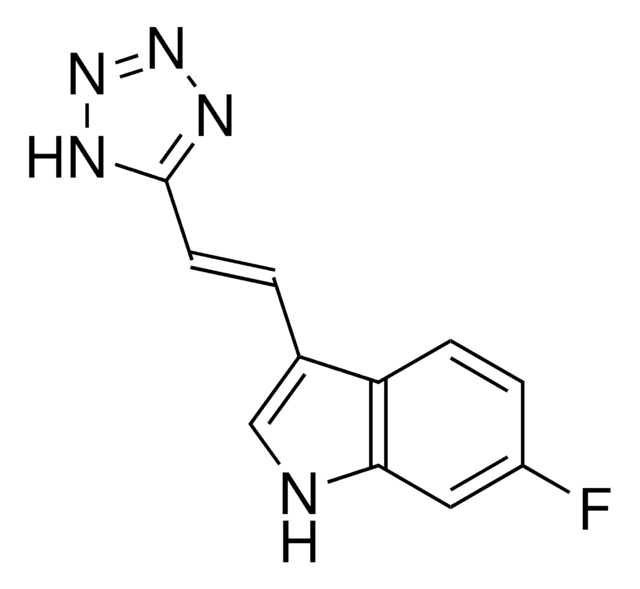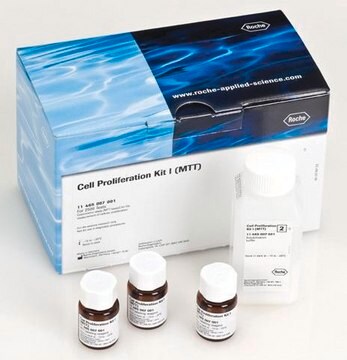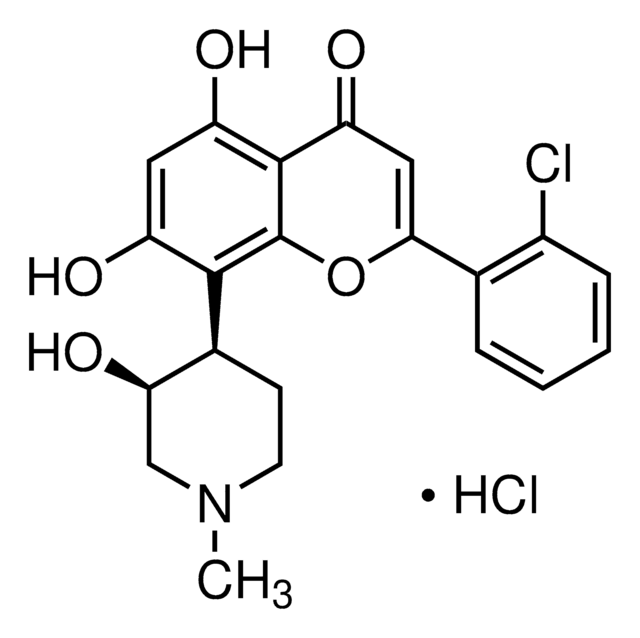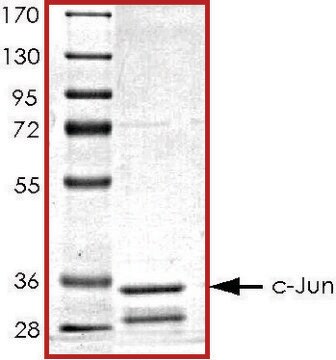SRP2088
C-jun, proto oncogene human
recombinant, expressed in insect cells, ≥80% (SDS-PAGE)
Sinônimo(s):
AP-1, AP1, c-Jun
Faça loginpara ver os preços organizacionais e de contrato
About This Item
Código UNSPSC:
12352200
NACRES:
NA.26
Produtos recomendados
fonte biológica
human
recombinante
expressed in insect cells
Ensaio
≥80% (SDS-PAGE)
forma
frozen liquid
peso molecular
~37.5 kDa
embalagem
pkg of 5 μg
condição de armazenamento
avoid repeated freeze/thaw cycles
concentração
250 μg/mL
cor
clear
colorless
nº de adesão NCBI
nº de adesão UniProt
Condições de expedição
dry ice
temperatura de armazenamento
−70°C
Informações sobre genes
human ... JUN(3725)
Ações bioquímicas/fisiológicas
The transcription factor AP-1 (activator protein-1) is involved in cellular proliferation, transformation and death. AP-1 and nuclear factor B (NF- B) can be specifically targeted to prevent cancer induction in mouse models. AP-1 can be produced by 18 different dimeric combinations of proteins from the Jun (c-Jun, JunB and JunD) and Fos (c-Fos, FosB, Fra-1 and Fra-2) families, including Jun homodimers and Jun-Fos heterodimers. The Jun and Fos proteins contain a basic-region leucine zipper (bZIP) domain, and are capable of binding to other bZIP proteins including those from the ATF, MAF, CNC and C/EBP (CCAAT/enhancer-binding protein) subfamilies (5]) Jun-Jun and Jun-Fos dimers bind with highest affinity to the 12-O-tetradecanoylphorbol-13-acetate (TPA) response element (TRE) [TGA(C/G)TCA], although many other ′AP-1-like sites′ have been reported. Binding to any of these sites can be tissue-specific, or affected by neighboring sequences, and dependent upon interactions with other transcription factors or cofactors. Jun and Fos proteins can also dimerize with other bZIP proteins, allowing them to target other DNA binding sites, such as the cAMP response element (CRE), the antioxidant response elements (ARE), and half-sites composed of half of a TRE site and half of a MAF- or CNC-binding site. In addition, AP-1 proteins can interact with other proteins, including the p65 subunit of NF- B, CBP (CRE-binding-protein-binding protein) (p300), SMAD-3 and -4, and the retinoblastoma protein (see 5 for a more complete list), further increasing the combinatorial potential of Jun and Fos proteins. AP-1 regulates a variety of cellular processes, including proliferation, differentiation and apoptosis, and contributes to both basal and stimulus-activated gene expression. It is activated by growth factors, hormones, stress, cytokines, ROS and ultraviolet radiation Activation occurs both transcriptionally and post-translationally, and is signaled predominantly through the mitogen-activated protein kinase (MAPK) cascade. The combinatorial diversity of AP-1 proteins and other interacting factors appears to influence how specific cell types respond to a stimulus. The growth-promoting activity of c-Jun is mediated by repression of tumor suppressors, as well as up-regulation of positive cell cycle regulators. Mostly, c-Jun is a positive regulator of cell proliferation, whereas JunB has the converse effect.
forma física
Clear and colorless frozen liquid solution
Nota de preparo
Use a manual defrost freezer and avoid repeated freeze-thaw cycles. While working, please keep sample on ice.
Código de classe de armazenamento
10 - Combustible liquids
Classe de risco de água (WGK)
WGK 1
Ponto de fulgor (°F)
Not applicable
Ponto de fulgor (°C)
Not applicable
Certificados de análise (COA)
Busque Certificados de análise (COA) digitando o Número do Lote do produto. Os números de lote e remessa podem ser encontrados no rótulo de um produto após a palavra “Lot” ou “Batch”.
Já possui este produto?
Encontre a documentação dos produtos que você adquiriu recentemente na biblioteca de documentos.
F J Rauscher et al.
Cell, 52(3), 471-480 (1988-02-12)
The adipocyte P2 (aP2) gene contains a regulatory element, FSE2, that functions during adipocyte differentiation and binds a protein complex containing the product of the fos proto-oncogene (Fos). We show here that the quantitative and qualitative nature of the FSE2
Fos and Jun: the AP-1 connection.
T Curran et al.
Cell, 55(3), 395-397 (1988-11-04)
F J Rauscher et al.
Science (New York, N.Y.), 240(4855), 1010-1016 (1988-05-20)
The Fos protein complex and several Fos-related antigens (FRA) bind specifically to a sequence element referred to as the HeLa cell activator protein 1 (AP-1) binding site. A combination of structural and immunological comparisons has identified the Fos-associated protein (p39)
Nossa equipe de cientistas tem experiência em todas as áreas de pesquisa, incluindo Life Sciences, ciência de materiais, síntese química, cromatografia, química analítica e muitas outras.
Entre em contato com a assistência técnica








